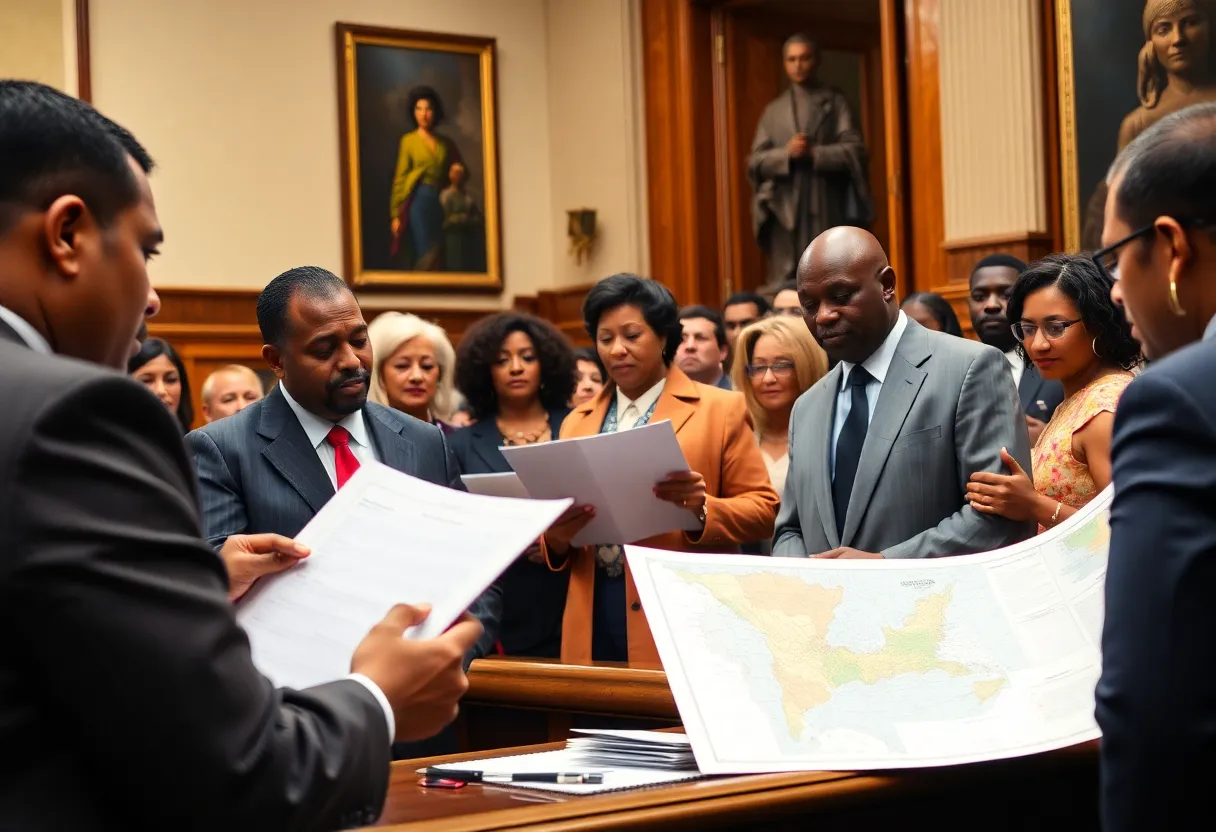News Summary
Louisiana is seeking to overturn key provisions of the Voting Rights Act that protect minority districts, significantly impacting political representation for Black voters. This controversy arises from a congressional redistricting map that includes two majority-Black districts. Louisiana’s position has shifted to argue against race-based redistricting, while Black voter groups maintain the necessity of such measures to ensure fair representation. The Supreme Court is expected to hear the case on October 15, 2025, and its ruling could reshape minority representation in Congress.
Louisiana is urging the U.S. Supreme Court to overturn key provisions of the Voting Rights Act that protect minority districts, which could reshape political representation for Black voters in the state and across the nation. This legal battle centers around a congressional redistricting map that currently includes two majority-Black districts among six total congressional seats.
On August 27, 2025, Louisiana and Black voters presented opposing briefs regarding this case. Louisiana’s recent stance is a shift from its previous defense of the congressional map, which was implemented after a prior map was determined to be racially discriminatory. Louisiana’s new arguments contend that any consideration of race during redistricting is unconstitutional, characterized as an “abhorrent system of racial discrimination.”
The state compares the provisions under Section 2 of the Voting Rights Act to race-conscious college admissions policies that the Supreme Court ruled against in 2023. Louisiana argues that sorting voters based on race is a violation of the Constitution. Attorney General Liz Murrill highlighted these views in the state’s brief, emphasizing a belief that the current system discriminates against voters based on skin color.
Opposing Views from Black Voter Groups
In stark contrast to state officials, the NAACP Legal Defense Fund and the ACLU are representing Black voters in this case. They assert that the Voting Rights Act remains essential to combat persistent racial discrimination and protect minority voting rights. Plaintiffs have pointed out that lower courts have repeatedly found Louisiana’s congressional map to illegally dilute Black voting power.
Black voter representatives stress that race-conscious redistricting is vital for countering ongoing discrimination within Louisiana. They argue that the court-ordered map that includes two majority-Black districts is necessary for fair representation, particularly given that nearly one-third of Louisiana’s population is Black.
Potential Consequences and Legal Implications
The Supreme Court is scheduled to hear oral arguments on October 15, 2025, with a decision expected by June 2026. The ruling could have significant implications for how minority representation is maintained in Congress and state legislatures going forward. If the court sides with Louisiana, protections offered under Section 2 of the Voting Rights Act could be severely weakened, potentially diminishing minority representation nationwide.
The ongoing legal discourse reflects broader efforts by Republican-led states that are attempting to revise redistricting maps in ways that could eliminate majority-Black districts. The current legal conflict centers on the Gingles test established by a 1986 Supreme Court ruling, which plaintiffs argue needs to be upheld to favor race-based redistricting. Any ruling against this test risks dismantling effective representation for minority groups across the country.
Background on Voting Rights Act
The Voting Rights Act, originally passed in 1965, was instrumental in prohibiting racial discrimination in voting and has seen various amendments and legal challenges over the decades. Section 2 of the Act specifically aims to ensure that minority voters have an equal opportunity to elect candidates of their choice. The historical context of the Voting Rights Act reflects the ongoing struggle against systemic racism and the quest for equal representation in the political sphere.
In Louisiana, the current congressional map was drawn only after federal court intervention highlighted the discriminatory practices in previous redistricting efforts. This legal case now stands as a decisive moment for voter rights advocacy, as justices have previously expressed skepticism regarding race-based redistricting in earlier sessions.
The clash between the principles of the Voting Rights Act and the Equal Protection Clause of the Constitution represents a critical juncture in U.S. electoral politics, with lasting effects on how states will approach redistricting in relation to minority populations.
Deeper Dive: News & Info About This Topic
- Politico: Louisiana Supreme Court Redistricting Case
- Wikipedia: Voting Rights Act of 1965
- MSNBC: Louisiana Republicans Challenge Voting Rights
- Google Search: Voting Rights Act
- Democracy Docket: Louisiana and Voting Rights Act
- Google Scholar: Voting Rights Act
- NOLA: Louisiana’s Supreme Court Case on Voting Rights
- Encyclopedia Britannica: Voting Rights Act
- KPEL: Louisiana Challenges Voting Rights Act in SCOTUS

Author: STAFF HERE NEWORLEANS WRITER
The NEW ORLEANS STAFF WRITER represents the experienced team at HERENewOrleans.com, your go-to source for actionable local news and information in New Orleans, Orleans Parish, and beyond. Specializing in "news you can use," we cover essential topics like product reviews for personal and business needs, local business directories, politics, real estate trends, neighborhood insights, and state news affecting the area—with deep expertise drawn from years of dedicated reporting and strong community input, including local press releases and business updates. We deliver top reporting on high-value events such as French Quarter Festival, New Orleans Jazz & Heritage Festival, and Essence Music Festival. Our coverage extends to key organizations like the New Orleans Chamber of Commerce and Greater New Orleans, Inc., plus leading businesses in energy, healthcare, and education that power the local economy such as Entergy, Ochsner Health, and Tulane University. As part of the broader HERE network, including HEREShreveport.com, we provide comprehensive, credible insights into Louisiana's dynamic landscape.

